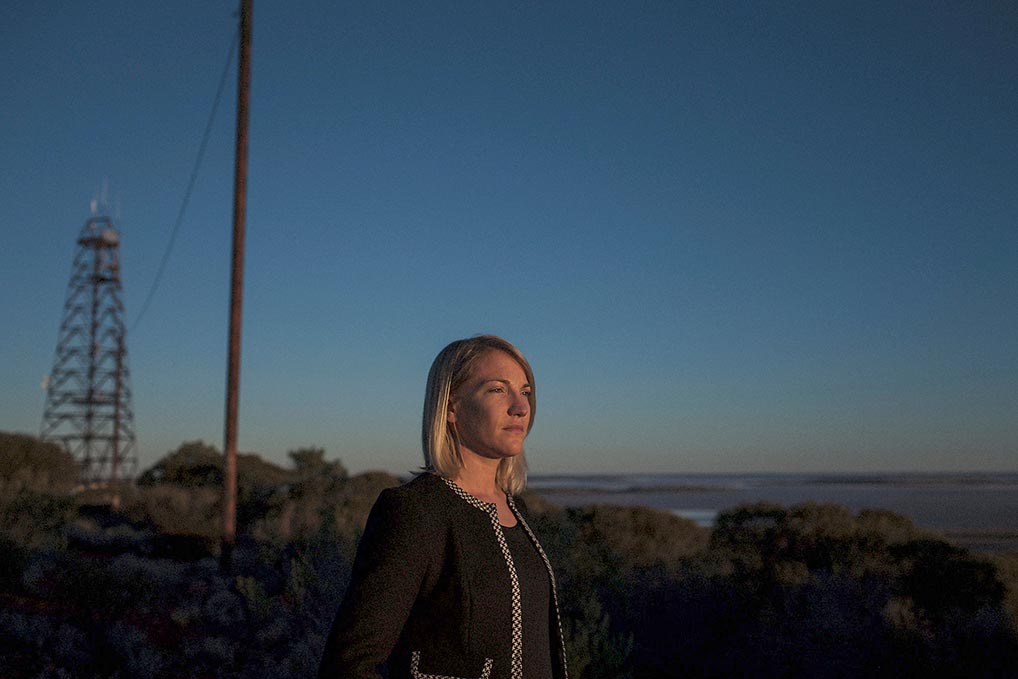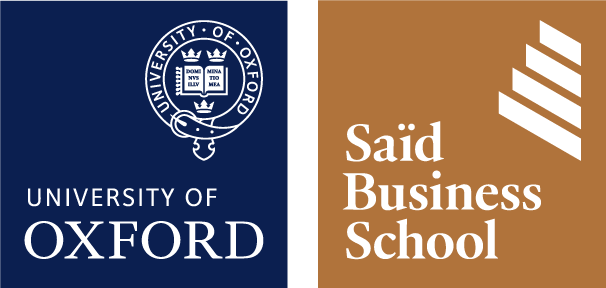Digging deep

Portrait: Steve Wise
Oxford Saïd alumna Kelly Carter, VP Legal and Compliance at Gold Fields Australia, is galvanising the mining sector’s untapped resource: women.
Words: Rob Brown
Rosalind had it all: intelligence, eloquence, vision, decisiveness, wit. You could say the protagonist of Shakespeare’s As You Like It had all the qualities you’d expect from – but are often sadly lacking in – 21st century leaders. Save one crucial flaw: to get what she wanted she had to pretend to be something that she was not: a man. The play was published in 1600. Yet it still resonates today.
‘As a blonde female lawyer, I’ve had to work hard to address expectations of women in my industry,’ says Kelly Carter, VP for Legal and Compliance at the Australian arm of South African mining giant Gold Fields. The company employs 2,500 people – just 16 per cent of whom are women. ‘There are no other women in the Australian executive team. I was acutely aware I was joining a regional executive exclusively comprised of middle-aged men. My tendency in that situation was to try and assimilate.’
As a blonde female lawyer, I’ve had to work hard to address expectations of women in my industry
In other words, “do a Rosalind” and act more like the men who dominate her industry. That Carter is the only woman on Gold Fields’ regional executive is typical of the mining industry as a whole; there are only 35 women on the boards of the world’s 30 biggest mining companies, out of a total 377 board directors, making it the most male-dominated industry on the planet, according to EY. The temptation to adopt the values, views and approaches of her mostly male peers – and try to ignore her own – is therefore understandable. But it’s in no way desirable, says Carter and is a view echoed by other enlightened leaders.
It’s an ethos also shared on Saïd Business School’s Women Transforming Leadership (WTL) programme, which Carter attended in 2014, before enrolling on the Oxford Programme on Negotiation a year later. WTL is an intensive five-day course that attracts female leaders of diverse backgrounds. Last year, 55 women from 17 countries attended. Drawn from the private, public and voluntary sectors, their industries ranged from manufacturing, mining and petroleum to professional services, jewellery and IT.
‘The variety on the programme really underlines one of our key objectives, which is to introduce each participant to women who are leading in circumstances which may seem different from theirs, but may also be surprisingly similar,’ says Kathryn Bishop, Associate Fellow, Saïd Business School. ‘For that reason, you may learn as much from the person sitting next to you as you will from the person in front with the slides – and that kind of co-creation of learning makes for a very rewarding week.’
We’re trying to increase the repertoire of ways in which women lead and feel comfortable leading
WTL has two key aims, she adds: ‘We’re trying to increase the repertoire of ways in which women lead and feel comfortable leading. Then the programme encourages them to start to transform what society in general thinks leadership is. We hope they will finish the week with a clear sense that their contribution is as valid as the next – even if it doesn't resemble the traditional idea of the hero leader who has all the answers. By virtue of it being different, it has value. That then inspires them to go and find other people with other experiences and backgrounds.’
In short, it helps foster greater diversity in business and society in general. But this isn’t about setting narrow definitions of character traits as male and female, although one session does explore the issue of gender bias in As You Like It. Instead, this is about analysing one’s own strengths and weaknesses in a variety of ways (in one workshop, attendees are asked to conduct an Oxford college choir) and think of their leadership traits in terms of a spectrum.
At one end is the command and control style of leadership espoused by the mostly male titans of industry of around the turn of the 20th century; the Henry Fords, the Michael Marks and Thomas Spencers. Their model was based on experience; invariably they founded or worked their way up an organisation and fulfilled most of the key roles within it. What they didn’t know wasn’t worth knowing. But the world has changed since their heyday.
Collaborative leadership
The problems facing today’s leaders are far more complex. There isn’t always a ‘right’ answer – think climate change, obesity or land rights; such issues require a much broader approach. Enter the leaders from the opposite side of the spectrum; those who don’t always have the answer, but have the ability to pick a team which does collectively; leaders who have the emotional intelligence to collaborate and view problems from a wider range of perspectives.
Of course, the former side isn’t male and the latter isn’t female. Men and women exhibit different traits from across the spectrum, but those differences tend to be stifled when a group is more homogenous. Carter has experienced this first hand. ‘When you’re in a male-dominated industry, you can be less inclined to celebrate your differences,’ she says. ‘You are more likely to try and silence them as opposed to taking advantage of them.’
There have been numerous instances in the mining industry of both spectacularly poor corporate strategic decision-making and incident management
So homogeneity can create an echo chamber. There’s even some evidence to suggest that the more pale, male and stale a board is, the less efficient, adaptable and ultimately profitable the business is likely to be, although research of this nature is still in its infancy. Profits aside, greater diversity in a leadership team can be to the benefit of the people operating within an operation, so long as opposing views within an executive are given due consideration.
‘There have been numerous instances in the mining industry of both spectacularly poor corporate strategic decision-making and incident management,’ says Carter. ‘This has given cause for reflection, and the industry has started to see the issues that can be created by having homogenous teams, leadership groups and boards. The industry has started to reflect on the quality of its decision-making. There’s a recognition that a team or board with diverse perspectives and experience leads to better decision-making.’
An example is better provision of mental healthcare for Gold Fields’ Australian workers on the ground, says Carter. The company’s Australian operations account for about 50 per cent of its global turnover and are spread over a vast area, requiring workers to be flown in for periods of up to two weeks and then going home for up to a week before returning.
‘There are particular risks and challenges facing people who are spending prolonged periods away from their families. In my view, the lack of diversity at both an industry and regulatory level contributed significantly to those issues being neglected for a long time. They are now being better addressed by both industry and government, with better outcomes for both workers and their families. While I’m not saying that this change is exclusively a result of leadership teams becoming more diverse, the ability for different perspectives and experiences to be put forward and discussed at a senior level has inevitably resulted in greater weight being given to these important issues.’
There are particular risks and challenges facing people who are spending prolonged periods away from their families
This can also affect areas such as project development, mergers and acquisitions. ‘There have been projects where commitment bias alone has driven the outcome,’ she adds. ‘People have just become wedded to a decision or a course of action and have felt compelled to just carry on, rather than drawing a line in the sand and perhaps talking a different course.’
In many cases, particularly when it comes to the myriad negotiations Carter has to undertake in her role, success rests on an ability to empathise and keep an open mind. These are skills honed on the Oxford Programme on Negotiation in 2015. ‘I now take a much more strategic, relationship-based approach,’ she explains. ‘It’s about investing time at the beginning of the negotiation process to consider the objectives and imperatives of the people I’m negotiating with. Understanding who they and their stakeholders are, and how this informs their priorities. Then it is about going through a mapping process to identify potential obstacles and opportunities. I’ve found this so invaluable in all the negotiations I am involved in, from straight down the line commercial negotiations to dealing with indigenous groups with interests in the land on which we want to operate. It’s about understanding the position the other side has come to and finding a solution that benefits all parties.’

Portrait: Steve Wise
Challenging conventions
Carter’s position is clear: greater diversity in Gold Fields’ management fosters a plurality of ideas. Therefore, she’s looking to foster greater diversity within the organisation. That means attracting more women and people from a greater range of ethnic backgrounds into the mining industry. One of the ways Carter has been looking to do this is by speaking to children from primary school age up about the industry.
I find it fascinating that from such a young age, children can have strong ideas of boy jobs and “girl jobs”
‘I recently had a five-year-old boy say to me: “I didn’t know a lady could be the boss of a mine site.” I find it fascinating that from such a young age, children can have strong ideas of “boy jobs” and “girl jobs”, and that this can have a direct impact on whether girls feel comfortable gravitating towards science, technology, engineering and maths-type activities. I’m very passionate about encouraging schools to really challenge that,’ she says.
‘The expectation of women having more empathy and being more nurturing is created from a very young age. Self-centred or unthinking behaviour is often excused as “boys will be boys”, yet assertive girls are often considered to be “bossy” and not “nice”. That takes hold very early and develops as time goes by. I have found there can be a resistance to or criticism of females that may have a stronger leadership style that’s thought of as being more “male”, but equally if they are “softer” in approach, they are considered ineffective – the inescapable double bind. While things are getting better, we do have to continue to challenge not only these unhelpful stereotypes, but also our expectations of what leadership is.’

Portrait: Steve Wise
Encouraging greater awareness of one’s own leadership style is at the heart of the WTL programme. Carter says the moment of revelation for her came in 2014, when her course was called on to conduct a college choir in the 19th century chapel of Balliol College, Oxford. It might sound like the anxiety dream of a stressed executive, but Carter says it was one of the most valuable exercises of her time at Oxford. “It was life changing,” she says. “It’s intended to take you out of your comfort zone and make you think differently about your leadership style. Some people literally marched up and began to conduct without any engagement with the choir. Some were impervious to what was going on because they were pursuing their own agenda of getting to the end of the music. Others took time to build a relationship, even if it was only through eye contact, before commencing. It raised important questions of your awareness of what’s going on around you and the pressure you may inadvertently be putting people you’re working with under. It really holds a mirror up to yourself.’ And every leader needs that from time to time, don’t they?
Kelly Carter features in Saïd Business School’s Be Bold for Change exhibition, which celebrates the contribution Oxford Saïd women have made to business, their communities, and equality and diversity over the last 21 years.
Viewpoint:
Effective negotiation
Negotiation is at the heart of Kelly Carter’s role at Gold Fields. Her responsibilities include everything from contractual negotiations to discussions with indigenous communities over land rights. In 2015, she attended the Oxford Programme on Negotiation, a course codeveloped by former World Bank director Tim Cullen MBE.
‘We very much focus on getting under the skin of the whoever you are dealing with. In Kelly’s context, I think that is particularly valuable. You have to try and understand where the person on the other side of the table is coming from. However opposed to your view they might be or unappealing, you need to understand people's psychological biases. And one of the big things we teach is understanding these biases and why some behaviour may appear to be irrational.
‘If you understand these biases, you will know how to calibrate your responses to whoever you are negotiating with. We advocate the concept of creating versus claiming value.
‘The classic example is the negotiations that took place in Camp David in 1978 when Israel and Egypt said they wanted the Sinai Desert; that was impossible, you couldn’t cut it in half. But the simple question “Why” that President Jimmy Carter posed, elicited these responses. Israel said they wanted it for security. Egypt said it was an issue of sovereignty; “it belongs to us, therefore it should be the same colour as Egypt on the map.”
‘Therefore it was agreed that it could be Egyptian but Egypt could never put anything military there. That is value creation. Both sides get what they want.’
